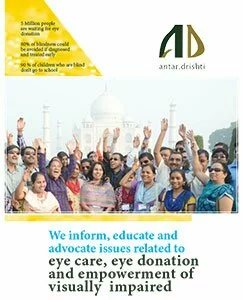Eyes on Diabetes, World Diabetes Day (WDD) 2016
The International Diabetes Federation (IDF) has launched the World Diabetes Day (WDD) 2016 campaign under the theme Eyes on Diabetes. The year’s activities and materials will focus on promoting two key messages:
- Screening for type 2 diabetes is important to modify its course and reduce the risk of complications
- Screening for diabetes complications is an essential part of managing type 1 and type 2 of diabetes
IDF has estimated that globally as many as 193 million people, or close to half of all adults living with diabetes in 2015, are unaware of their disease. Most of these cases are type 2 diabetes. The earlier a person is diagnosed, the earlier treatment can be initiated in order to reduce the risk of harmful and costly complications. A person with type 2 diabetes can live for several years without showing any symptoms, during which time high blood glucose is silently damaging the body. There is therefore an urgent need to screen, diagnose and provide appropriate treatment to people with diabetes. WDD 2016 will highlight the feasible and cost-effective solutions that exist to help identify people with undiagnosed type 2 diabetes and those at risk of developing it in the future.
Diabetes is a leading cause of cardiovascular disease, blindness, kidney failure and lower-limb amputation. Over one third of all people currently living with type 1 and type 2 diabetes will develop some form of damage to their eyes that can lead to blindness. These complications can be prevented or delayed by maintaining blood glucose, blood pressure and cholesterol levels as close to normal as possible. Many complications can be picked up in their early stages through screening, so that treatment can be given to prevent them becoming more serious. WDD 2016 will highlight the importance of integrating screening for diabetes complications into ongoing care for people living with diabetes.
Supporting materials for WDD 2016 will be released from May through to September to help campaign stakeholders and the wider diabetes community prepare for activities on November 14.
Screening for type 2 diabetes is important to modify its course and reduce the risk of complications.
- Diabetes is a huge and growing burden: 415 million adults were living with diabetes in 2015 and this number is expected to increase to around 642 million or one in ten adults by 2040.1
- One in two adults with diabetes is undiagnosed.1
- Many people live with type 2 diabetes for a long period of time without being aware of their condition. By the time of diagnosis, diabetes complications may already be present.
- Up to 70% of type 2 diabetes cases can be prevented or delayed by adopting healthier lifestyles, equivalent to up to 160 million cases by 2040.1
- With increasing levels of poor nutrition and physical inactivity among children in many countries, type 2 diabetes in childhood has the potential to become a global public health issue leading to serious health outcomes.1
- 12% of total global expenditure on health is currently spent on adults with diabetes.1
- The number of people with diabetes in low- and middle-income countries will continue to grow, posing a threat to sustainable development. For example by 2040, the number of people with diabetes in Africa is expected to double.1
Screening for diabetes complications is an essential part of managing all types of diabetes.
- One in two people with diabetes remain undiagnosed,1 which makes them particularly susceptible to the complications of the condition, causing substantial disability and premature death.
- More than 640 million of us may be living with diabetes by 2040.1Delayed diagnosis means that many people with type 2 diabetes will suffer from at least one complication by the time they are diagnosed with diabetes.
- In many countries diabetes is a leading cause of blindness, cardiovascular disease, kidney failure and lower-limb amputation.1
- More of us will develop and live with type 1 diabetes. Screening for diabetes complications is an important part of effective management of the disease, to ensure optimal health.
- Of the 415 million adults worldwide living with diabetes in 2015,1 over one third will develop some form of diabetic retinopathy – a complication of diabetes that can lead to vision impairment and blindness.2
- More than 93 million adults, or one in three, currently living with diabetes have diabetic retinopathy.2
- The management of diabetes and its complications begins in primary health care and this should include screening for diabetic retinopathy
- Early detection and timely treatment of diabetic retinopathy can prevent vision loss and reduce the impact of diabetes on individuals, their carers and society.
- Careful management of diabetes and screening for diabetic eye disease can help prevent visual impairment and blindness.
- Global health spending to treat diabetes and manage complications was estimated at e USD 673 billion in 2015.1



 We at Antardrishti (www.antardrishti.org) inform, educate and advocate issues related to eye care, eye donation and empowerment of visually impaired (Profile attached) looking for fund in terms of donation/ sponsorship/ venture fund/ partnership/ investment etc… to expend our activities.
We at Antardrishti (www.antardrishti.org) inform, educate and advocate issues related to eye care, eye donation and empowerment of visually impaired (Profile attached) looking for fund in terms of donation/ sponsorship/ venture fund/ partnership/ investment etc… to expend our activities.